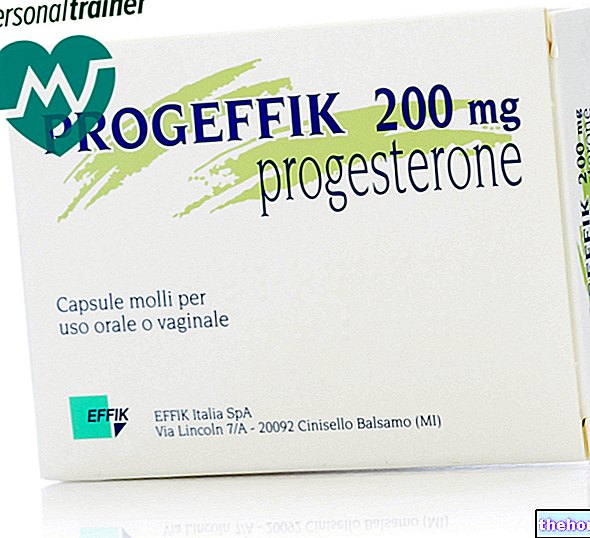Active ingredients: Progesterone (Medroxyprogesterone acetate)
TRY 100 mg tablets
TRY 250 mg tablets
Indications Why is Provera used? What is it for?
Provera contains the active substance medroxyprogesterone acetate. Medroxyprogesterone belongs to a group of medicines called progestogens which work by slowing the growth of some hormone-sensitive tumors.
Provera is used:
- for the treatment of cancer of the tissue lining the inner wall of the uterus (endometrial cancer), kidney cancer and breast cancer in women who are no longer menstruating (postmenopausal). Provera is used in combination with other medicines when these tumors have spread to different parts of the body (metastases) or when they no longer respond to specific treatments.
- in case of excessive weight loss and a noticeable reduction in the normal functions of the organism in the advanced stages of cancer or in AIDS, a serious disease of the immune system.
Contraindications When Provera should not be used
Do not take Provera:
- if you are allergic to medroxyprogesterone or any of the other ingredients of this medicine (listed in section 6);
- if you are or think you may be pregnant (see pregnancy and breastfeeding section);
- if you have observed bleeding from the vagina and do not know the cause;
- if you have severe liver problems (liver failure);
- if your doctor suspects or has ascertained that you have early stage breast or genital cancer.
Precautions for use What you need to know before taking Provera
Talk to your doctor or pharmacist before taking Provera if you think any of the following apply to you as some of these conditions may require your doctor to check you frequently while taking this medicine:
- you have heavy bleeding from your vagina, but you don't know the cause. You must undergo medical tests to find out the causes of this disorder before taking Provera (see section Do not take Provera);
- have or have ever suffered from water retention;
- have or have ever suffered from depression;
- have diabetes or an "intolerance to some sugars;
- have high levels of calcium in the blood due to cancer that has spread to the bone;
- have kidney problems (kidney failure);
- have liver problems (see section Do not take Provera);
- you are a premenopausal woman because taking this medicine may mask the end of your fertile period.
Tell your doctor if any of the following develop or worsen while taking this medicine (see also section 4 Possible side effects):
- sudden partial or complete loss of vision, bulging eyes, double vision of images or migraines that you did not have before. Stop taking Provera immediately and have an eye examination before you start taking this medicine again;
- sudden swelling and pain in the limbs, especially in the legs, or sudden onset of chest pain and difficulty in breathing. These could be symptoms of blood clots forming in the veins (thrombi), or transporting these blood clots to the lungs, where they stop occluding another blood vessel (thromboembolism). Stop taking Provera immediately and contact your doctor;
- Cushing's syndrome, a disorder that can occur with some or all of the following symptoms:
- tiredness or easy fatigue
- rapid weight gain and obesity, especially in the trunk and face
- loss of sexual desire, impotence, frigidity
- increased blood pressure (arterial hypertension)
- change in your menstrual cycle (dysmenorrhea) or interruption of your menstrual cycle (amenorrhea)
- abnormal hair growth (hirsutism)
- sudden changes in mood (depression, nervousness, irritability)
- skin problems, such as red-purple streaks especially on the hips, abdomen and lower limbs and increased sebum production (oily skin and / or hair)
- pain in the bones and joints
- lengthening of the wound healing time
- increased sensitivity to infections
While taking Provera, your doctor may advise you to take adequate amounts of calcium and vitamin D and to have regular tests to assess the condition of your bones (bone mineral density tests), especially if you have to take this medicine for a long time. period of time.
Laboratory tests
- If you have been advised to go to a specialized laboratory to undergo tests based on taking (biopsies) of tissue fragments from the uterus, you must inform the laboratory staff that you are taking Provera because the use of this medicine may alter the exam results;
- If you have been advised to have blood tests, you should tell your doctor and / or laboratory staff that you are taking Provera because the use of this medicine can alter the levels of some hormones in your blood.
Interactions What medications or foods may change the effect of Provera
Tell your doctor or pharmacist if you are taking, have recently taken or might take any other medicines.
It is especially important that you tell your doctor if you are taking medicines containing aminoglutethimide, a substance used to treat advanced breast or prostate cancer, as they may decrease the effectiveness of Provera.
Warnings It is important to know that:
Pregnancy and breastfeeding
If you are pregnant or breast-feeding, think you may be pregnant or are planning to have a baby, ask your doctor or pharmacist for advice before taking this medicine.
Pregnancy
Provera must not be used during pregnancy (see section Do not take Provera) because taking this medicine during the first 3 months of pregnancy may cause birth defects in the fetus. If you become pregnant during use, you should immediately stop taking Provera and consult your doctor.
Feeding time
Medroxyprogesterone acetate, the active ingredient in Provera, passes into breast milk. As its effect on the baby is not known, ask your doctor for advice before taking this medicine while breastfeeding.
Driving and using machines
It is not known whether Provera affects the ability to drive or use machines. If you are unsure, ask your doctor or pharmacist.
Dose, Method and Time of Administration How to use Provera: Posology
Always take this medicine exactly as your doctor or pharmacist has told you. If in doubt, consult your doctor or pharmacist.
Cancer of the endometrium (lining of the uterus) and kidney
The recommended dose is 200 mg to 400 mg per day.
Breast cancer
The minimum recommended dose is 400 mg per day.
Your doctor will advise you on the duration of treatment with Provera that is most suitable for you. The treatment may take 8-10 weeks before any effects are seen.
Provera therapy should be discontinued if the disease progresses rapidly while taking this medicine.
Excessive weight loss and noticeable reduction in the normal functions of the organism in case of advanced stages of the cancer or a serious disease of the immune system called AIDS
The recommended dose is 1000 mg per day (taken as one or two doses per day)
Overdose What to do if you have taken too much Provera
If you take too many Provera tablets, contact your doctor immediately.
If you have any further questions on the use of this medicine, ask your doctor or pharmacist.
Side Effects What are the side effects of Provera
Like all medicines, this medicine can cause side effects, although not everybody gets them.
Stop taking this medicine and see your doctor immediately if you experience the following side effects as they can be serious (see section 2 Warnings and precautions):
- severe allergic reaction (such as anaphylactic shock);
- swelling of the face, tongue and throat, which can cause problems with swallowing and breathing (angioedema);
- sudden partial or total loss of vision, bulging eyes, double vision of images or headache;
- sudden swelling and pain in the limbs, especially in the legs, or sudden onset of chest pain and difficulty in breathing. These may be symptoms of blood clots in the veins (thrombi);
- brain infarction. Symptoms of a brain infarction can be:
- speech disorders
- losing strength in half of the body (half face, arm and leg, right or left side)
- feeling tingling or numbness in half of the body - not seeing well in half of the field of view
- clumsy movements, loss of balance, dizziness
- severe and sudden headache
Other symptoms not listed in this leaflet may also occur. If you, or any of the people close to you, suspect that you are having a brain infarction, go to a hospital emergency room immediately.
- Sudden chest pain, because it can be a symptom of a heart attack or pulmonary embolism;
- heart problems (congestive heart failure).
Other side effects:
Common (may affect up to 1 in 10 people):
- change in body weight
- increased appetite
- insomnia
- headache
- dizziness
- tremors
- vomiting, constipation, nausea
- excessive sweating
- impotence
- fluid retention in the body, swelling in different parts of the body, especially in the ankles and / or legs (edema)
- fatigue
Uncommon (may affect up to 1 in 100 people):
- effects similar to those of corticosteroids, such as eg. Cushing's syndrome (see section 2 "Warnings and precautions")
- worsening of diabetes mellitus
- high levels of calcium in the blood
- depression
- euphoria
- change in sexual desire
- inflammation of the veins, especially of the legs, resulting in blood clots
- diarrhea
- dry mouth
- acne
- abnormal hair growth (hirsutism)
- abnormal bleeding from the vagina (irregular, increased or reduced)
- breast pain
- muscle spasms
Rare (may affect up to 1 in 1000 people):
- hypersensitivity
- nervousness
- drowsiness
- yellowish discoloration of the skin, the white part of the eye and the mucous membranes of the oral cavity (jaundice)
- patchy hair loss (alopecia)
- rash
- malaise
- fever
- changes in blood glucose (blood sugar) levels after performing a glucose load test. This condition is known as "reduced glucose tolerance"
- high blood pressure (high blood pressure)
Frequency not known (frequency cannot be estimated from the available data):
- prolonged absence of ovulation
- confusion
- loss of concentration
- hand tremors, sweating, night cramps in the calves (adrenergic-like effects)
- eye damage due to occlusion of an "artery that carries blood to the eye" (retinal embolism and thrombosis)
- cataracts (as a complication of diabetes)
- vision disturbances
- rapid heartbeat (tachycardia)
- heightened perception of one's heartbeat (palpitations)
- hives, itching
- presence of sugar in the urine
- absence of menstruation (amenorrhea)
- ulcers of the mucous membrane of the lower part of the uterus (cervix)
- discharge from the cervix (the lower part of the uterus)
- abnormal secretion of milk from the breasts even when not in the breastfeeding phase
- impotence (in young males with AIDS)
- abnormal liver function tests
- increase in the number of white blood cells and platelets
Reporting of side effects
If you get any side effects, talk to your doctor or pharmacist. This includes any possible side effects not listed in this leaflet. You can also report side effects directly via the national reporting system at http://www.agenziafarmaco.gov.it/it/responsabili. By reporting side effects you can help provide more information on the safety of this medicine.
Expiry and Retention
Keep this medicine out of the sight and reach of children.
Do not use this medicine after the expiry date which is stated on the carton and bottle after "Expiry". The expiry date refers to the last day of that month.
This medicine does not require any special storage conditions.
Do not throw any medicines via wastewater or household waste. Ask your pharmacist how to throw away medicines you no longer use. This will help protect the environment.
Deadline "> Other information
What Provera contains
The active ingredient is medroxyprogesterone acetate.
Each Provera 100 mg tablet contains 100 mg of medroxyprogesterone acetate.
Each Provera 250 mg tablet contains 250 mg of medroxyprogesterone acetate.
The other ingredients are: microcrystalline cellulose, maize starch, sodium benzoate, magnesium stearate, macrogol 400, sodium starch glycolate, sodium docusate, gelatin (Byco C).
What Provera looks like and contents of the pack
Provera 100 mg tablets are round, flat, white tablets scored on one side and debossed with "U 467" on the other side.
The tablets are available in glass bottles in packs of 50 tablets. Provera 250 mg tablets are round, flat, white tablets scored on one side and debossed with "U 403" on the other side. The tablets are available in glass bottles in packs of 30 tablets.
Not all pack sizes may be marketed.
Source Package Leaflet: AIFA (Italian Medicines Agency). Content published in January 2016. The information present may not be up-to-date.
To have access to the most up-to-date version, it is advisable to access the AIFA (Italian Medicines Agency) website. Disclaimer and useful information.
01.0 NAME OF THE MEDICINAL PRODUCT -
TRY TABLETS
02.0 QUALITATIVE AND QUANTITATIVE COMPOSITION -
PROVERA 100 mg tablets One tablet contains:
active ingredient: medroxyprogesterone acetate 100 mg
TRY 250 mg tablets
One tablet contains:
active ingredient: medroxyprogesterone acetate 250 mg
For the full list of excipients, see section 6.1.
03.0 PHARMACEUTICAL FORM -
Tablets.
Provera 100 mg tablets are round, flat, white tablets scored on one side and debossed with "U 467" on the other side.
Provera 250 mg tablets are round, flat, white tablets scored on one side and debossed with "U 403" on the other side.
04.0 CLINICAL INFORMATION -
04.1 Therapeutic indications -
PROVERA is indicated:
• as additive and / or palliative therapy in the treatment of recurrent and / or metastatic endometrial or renal cancer and in the treatment of metastatic breast cancer in postmenopausal women;
• in the anorexia-cachexia syndrome due to advanced malignant neoplasia and AIDS.
04.2 Posology and method of administration -
Endometrial and renal cancer: 200 to 400 mg / day.
Breast cancer: not less than 400 mg / day.
Treatment with PROVERA should be continued until a positive response to treatment is evident.
Note: The response to hormonal treatment of endometrial, kidney and breast cancer may not be evident until 8-10 weeks after starting therapy.
Rapid disease progression during PROVERA therapy requires discontinuation of drug treatment.
Anorexia-cachexia syndrome due to advanced malignant neoplasia and AIDS: 1000 mg / day in a single administration or in two daily administrations.
04.3 Contraindications -
Hypersensitivity to the active substance or to any of the excipients listed in section 6.1.
Medroxyprogesterone acetate (MPA) is contraindicated in patients with the following conditions:
• Known or suspected pregnancy
• Vaginal bleeding of an unknown nature.
• Severe hepatic insufficiency.
• Known or suspected early stage breast or genital cancer.
04.4 Special warnings and appropriate precautions for use -
• In cases of undiagnosed vaginal bleeding, appropriate diagnostic measures are recommended.
• Since progestogens can cause some degree of water retention, they must be kept
conditions that could be affected by this factor are under observation.
• Patients with a history of clinical depression should be carefully monitored during
therapy with PROVERA.
• A decrease in glucose tolerance has been noted during treatment with
progestogens. For this reason, diabetic patients should be kept under close surveillance during progestogen therapy.
• Pathologists (laboratory) should be informed of the use of medroxyprogesterone acetate from
part of the patient if endometrial or endocervical tissue is examined.
• The physician / laboratory should be advised that the use of medroxyprogesterone acetate can
decrease the levels of the following endocrine markers:
to. plasma / urine steroids (e.g. cortisol, estrogen, pregnanediol, progesterone, testosterone)
b. plasma / urine gonadotropins (e.g. LH and FSH)
c. sex hormone binding globulin.
• If you were to experience a sudden partial or total loss of vision or in case of
exophthalmos, diplopia or migraine, interrupt the treatment and, before continuing it, carry out an ophthalmic check in order to exclude the presence of papillae edema and retinal vascular lesion.
• Medroxyprogesterone acetate has not been accidentally associated with the induction of disturbances
thrombotic or thromboembolic, however its use is not recommended in patients with a history of venous thromboembolism (VTE). It is recommended that medroxyprogesterone acetate be discontinued in patients who develop VTE during therapy.
• Medroxyprogesterone acetate can cause Cushingoid symptoms.
• Some patients being treated with medroxyprogesterone acetate may experience a
adrenal function suppressed. Medroxyprogesterone acetate can decrease blood levels of ACTH and hydrocortisone.
• The physician / laboratory should be informed that in addition to the endocrine biomarkers listed in the section "Special warnings and precautions for use" (section 4.4), the "use of medroxyprogesterone acetate for oncological indication may also result in" partial adrenal insufficiency (decrease in response of the pituitary-adrenal axis) during the metopyrone test. Thus the ability of the adrenal cortex to respond to ACTH must be demonstrated before administering metopyrone.
• Hypercalcemia in patients with bone metastases.
• Hepatic insufficiency (see section 4.3).
• Kidney failure.
Corticoid-like activity has been reported following administration of very high doses (500 mg / day or higher) used in the treatment of some cancers.
Progestin treatment in premenopausal patients can mask the onset of climacteric.
Decrease in bone mineral density
There are no studies of the effects on bone mineral density for medroxyprogesterone administered orally (e.g. for oncological use).
All patients are advised to take an adequate amount of calcium and vitamin D.
An assessment of bone mineral density would also be advisable in those patients taking medroxyprogesterone acetate for long-term treatment.
04.5 Interactions with other medicinal products and other forms of interaction -
Concomitant administration of PROVERA with aminoglutethimide can significantly depress the bioavailability of PROVERA.
Patients using high doses of PROVERA should be advised of the decreased efficacy with the use of aminoglutethimide. Medroxyprogesterone acetate (MPA) is metabolised primarily by hydroxylation via CYP3A4 in vitro. No specific drug-drug interaction studies have been conducted to evaluate the clinical effects of CYP3A4 inducers or MPA inhibitors.
04.6 Pregnancy and breastfeeding -
Pregnancy
Medroxyprogesterone acetate is contraindicated in pregnant women.
Some data suggest a possible relationship between the administration of progestins in the first trimester of pregnancy and the presence of congenital genital malformations in fetuses in particular circumstances.
If the patient becomes pregnant while using this drug, she should be advised of the potential risk to the fetus.
Feeding time
Medroxyprogesterone acetate and its metabolites are excreted in breast milk. There is no evidence to suggest that this poses a risk to the infant (see section 5.2 "Pharmacokinetic properties").
04.7 Effects on ability to drive and use machines -
No data are known in this regard.
04.8 Undesirable effects -
The table below provides a list of adverse drug reactions with frequency defined based on all-causality data in 1337 patients treated with MPA in 4 pivotal studies evaluating the efficacy and safety of MPA in oncology indications.
Reporting of suspected adverse reactions
Reporting of suspected adverse reactions that occur after authorization of the medicinal product is important, as it allows continuous monitoring of the benefit / risk ratio of the medicinal product.
Healthcare professionals are asked to report any suspected adverse reactions via the national reporting system at: "www.agenziafarmaco.gov.it/it/responsabili".
04.9 Overdose -
Oral doses above 3 g per day are well tolerated. In the event of an overdose, treatment is symptomatic and supportive.
05.0 PHARMACOLOGICAL PROPERTIES -
05.1 "Pharmacodynamic properties -
Pharmacotherapeutic group: sex hormones and modulators of the genital system - progestogens, ATC code: L02AB02.
Medroxyprogesterone acetate is an orally and parenterally active progesterone derivative. Its antitumor activity, when administered at pharmacological doses, is due to the action carried out at the level of the hypothalamic-pituitary-gonadal axis, at the level of estrogen receptors and on the metabolism of steroids at the tissue level. When used at the high doses required for the treatment of certain cancers (500 mg per day or more), "corticoid-like activity may occur.
Medroxyprogesterone acetate in high doses showed an anticachectic effect, accompanied by an increase in food intake. This effect seems to be related to an activity on the central control of the energy balance.
Reduction in bone mineral density
There are no studies on the effects of medroxyprogesterone acetate on reducing bone mineral density when administered orally.
However, a clinical study in adult women of childbearing age who received 150mg of medroxyprogesterone acetate every 3 months intramuscularly for contraceptive purposes showed an average reduction of 5.4% in lumbar spine bone mineral density. over 5 years, with at least partial recovery of bone density during the first two years after discontinuation of treatment. A similar clinical study in adolescent women, given medroxyprogesterone acetate 150 mg every 3 months intramuscularly to contraceptive purpose, demonstrated similar reductions in bone mineral density, which were even more pronounced during the first two years of treatment and which, again, were at least partially reversible once treatment was stopped.
05.2 "Pharmacokinetic properties -
Medroxyprogesterone acetate is rapidly absorbed from the gastrointestinal tract and vagina. Peak serum concentrations are observed after 2-6 hours (oral administration) and after 4-20 days (IM administration). The apparent half-life ranges from approximately 30-60 hours after oral administration to approximately 6 weeks after IM administration. Medroxyprogesterone acetate is 90-95% bound to plasma proteins. It crosses the blood brain barrier and is excreted in milk. Medroxyprogesterone acetate is eliminated in the faeces and urine.
05.3 Preclinical safety data -
Toxicological data relating to studies conducted on experimental animals using medroxyprogesterone acetate are as follows:
. LD50, oral administration - Mouse: higher than 10,000 mg / kg
. LD50, intraperitoneal administration - Mouse: 6.985 mg / kg
Following oral administration to rats and mice (334 mg / kg / day) and to dogs (167 mg / kg / day) treated for 30 days, no toxic effect was shown.
Chronic toxicity studies conducted on rats and dogs at doses of 3, 10 and 30 mg / kg / day treated for 6 months did not show any toxic effects at the tested levels.
At higher doses, only the appearance of the expected hormonal effects was observed.
Teratogenic studies conducted on pregnant female Beagle dogs, treated at doses of 1, 10 and 50 mg / kg / day by oral administration, revealed clitoral hypertrophy in female pups born from animals treated at the highest dose.
No abnormalities were found in the male pups.
The subsequent investigation carried out to verify the reproductive capacities of the females given birth from animals treated with medroxyprogesterone acetate, did not show any decrease in fertility.
Long-term toxicity studies conducted in monkeys, dogs and rats with parenteral administration of medroxyprogesterone acetate have shown the following effects:
1) Beagle dogs, treated at doses of 3 and 75 mg / kg every 90 days for 7 years, developed mammary lumps which were also observed in some control animals.
The nodules seen in the control animals were intermittent, while the nodules that appeared in the drug treated animals were larger, more numerous, persistent, and two of the animals treated at the higher dose developed malignant mammary tumors.
2) Two monkeys, treated at a dose of 150 mg / kg every 90 days for 10 years, developed undifferentiated carcinoma of the uterus, which did not appear in the monkeys of the control group and in those treated at doses of 3 and 30 mg / kg every 90 days for 10 years.
Mammary nodules of an intermittent nature were seen in the animals of the control group and in those treated at doses of 3 and 30 mg / kg, but not in the group that received the dose of 150 mg / kg.
At the autopsy (after 10 years) the nodules were found only in 3 of the monkeys of the group treated at the dose of 30 mg / kg.
The histopathological examination revealed that these nodules were hyperplastic in nature.
3) In the rat treated for 2 years, there was no evidence of any alteration at the level of the uterus and breasts.
Mutagenicity studies conducted using the Salmonella Microsome test (Ames test) and the Micronucleus test, have shown that medroxyprogesterone acetate has no mutagenic activity.
Other studies did not reveal any changes in fertility in the first and second generation of the animals observed.
It has not yet been ascertained whether the above observations can also be referred to in humans.
06.0 PHARMACEUTICAL INFORMATION -
06.1 Excipients -
Excipients of tablets: microcrystalline cellulose; cornstarch; sodium benzoate; magnesium stearate; macrogol 400; sodium starch glycolate; docusate sodium; gelatin (Byco C).
06.2 Incompatibility "-
Not relevant.
06.3 Period of validity "-
Tablets 100 mg - 250 mg: 3 years.
06.4 Special precautions for storage -
This medicine does not require any special storage conditions.
06.5 Nature of the immediate packaging and contents of the package -
PROVERA 100 mg tablets: glass bottle containing 50 tablets of 100 mg medroxyprogesterone acetate
PROVERA 250 mg tablets: glass bottle containing 30 tablets of 250 mg of medroxyprogesterone acetate.
Not all pack sizes may be marketed.
06.6 Instructions for use and handling -
No special instructions for disposal.
07.0 HOLDER OF THE "MARKETING AUTHORIZATION" -
Pfizer Italia S.r.l. - via Isonzo, 71 - 04100 Latina
08.0 MARKETING AUTHORIZATION NUMBER -
TRY 100 mg tablets, 50 tablets, AIC n. 020328136
PROVERA 250 mg tablets, 30 tablets, AIC n. 020328151
09.0 DATE OF FIRST AUTHORIZATION OR RENEWAL OF THE AUTHORIZATION -
June 2005
10.0 DATE OF REVISION OF THE TEXT -
AIFA determination of 23 May 2016




























